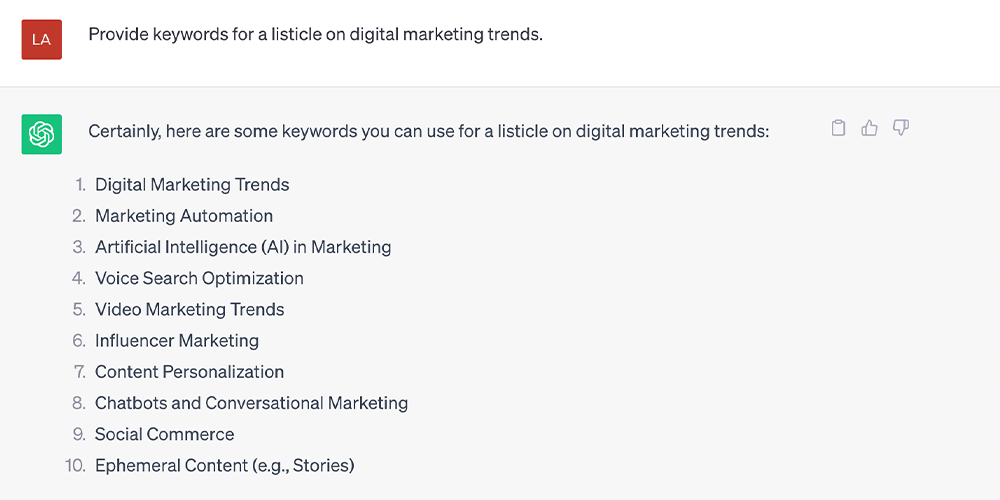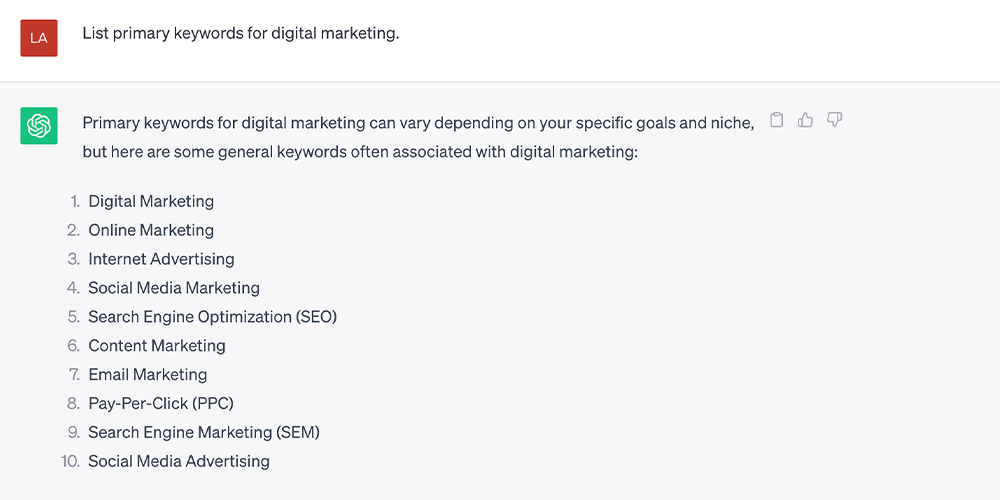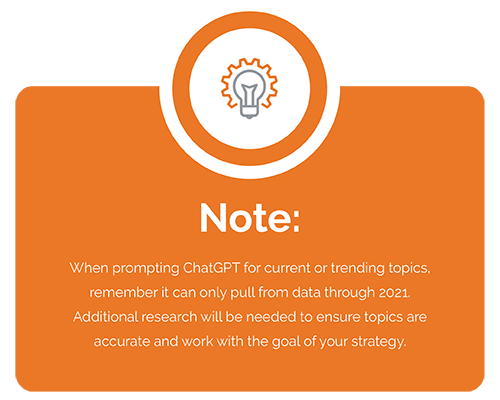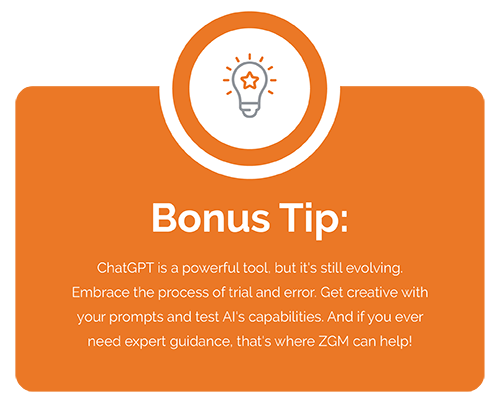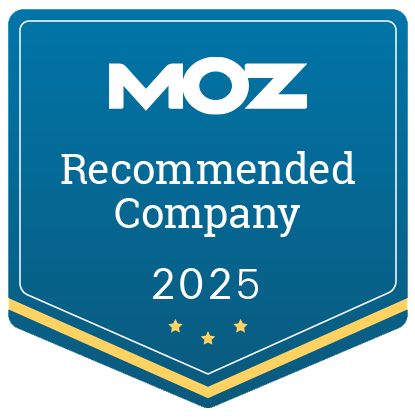In the ever-evolving world of digital marketing, where content is king and search engine optimization (SEO) is the crown jewel, businesses are constantly seeking innovative ways to stay ahead. Enter ChatGPT, a groundbreaking artificial intelligence (AI) tool that's turning the world of content creation and optimization upside down. SEO is no longer just about inserting keywords or building backlinks; it's about crafting content that resonates, engages, and ranks. With ChatGPT's ability to generate content based on specific prompts, optimizing website content for search engines has changed, and it’s essential to understand how this affects your strategy.
That’s where this blog can help! We’ll explore a bunch of prompts you can use in ChatGPT, shedding light on how they function and the benefits they offer. Whether you're a seasoned SEO expert or a business owner looking to boost your online visibility, understanding how to harness the power of ChatGPT prompts can be a game-changer. Let’s get started as we break down the potential how to use this AI tool in your SEO strategy.
What Is a ChatGPT Prompt?
A ChatGPT prompt is a question or statement fed to the ChatGPT AI model, eliciting a specific response. Think of it as instructing the AI to generate content or provide insights on a particular topic.
How to Tailor a Prompt?
Crafting the perfect prompt is an art. This means being specific, authentic, and concise to get the best output possible. Always provide context to get the most accurate results. And remember, patience is key. If you don't get it right the first time, don't be afraid of a little trial and error. After all, ChatGPT is still new and constantly learning.
Not sure where to begin? We’ve put together a list of some of the most simple and important prompts to use for SEO. Just remember, these aren’t the end all be all for your SEO strategy and the research involved. You’ll want to use these as a starting point and dig a bit deeper from there.
Prompts for Keywords:
- Find Initial Keywords: "List primary keywords for digital marketing.
- Keywords Related to Product Descriptions: "Generate keywords for organic skincare products."
- Top Competitor Keywords: "What are the primary keywords used by top digital marketing agencies?"
- Research Top/Best Related Keywords: "What are the top keywords related to SEO tools?"
- Listicle Content Keywords: "Provide keywords for a listicle on digital marketing trends."
- Classify Search Intents: "Classify the following keywords based on search intent: 'buy organic skincare,' 'how to apply skincare,' 'best skincare brands.'"
Prompts for Content:
- Trending Topics: "What are the current trending topics in digital marketing?"
- Content Clusters: "Suggest content clusters for SEO strategies."
- Blog Post Titles: From targeted to catchy, ChatGPT can generate a range of titles. For instance, "Suggest blog post titles related to SEO tools" or "Provide catchy blog titles for content marketing strategies."
- Blog Topics Based on Funnel Stage: "List blog topics for the awareness stage of the digital marketing funnel."
- Catchy Blog Titles: "Provide catchy blog titles for content marketing strategies."
- Blog Topics for Good Click-Through Rates: "List blog topics that are likely to have high click-through rates in the digital marketing niche."
- Write a Detailed Outline: "Craft a detailed outline for a blog post on the evolution of AI in digital marketing."
Prompts for Technical SEO:
- Code Snippets: "Provide a code snippet for a responsive website design."
- Schema Markup: "Generate schema markup for a product review."
- Title Tags & Meta Descriptions: "Write a title tag for an article on AI in marketing" or "Craft a user-friendly meta description for a blog post on content strategies."
- Generate a Robots.txt Rule: "Provide a robots.txt rule to disallow search engines from indexing the 'admin' directory."
- Create an XML Sitemap: "How can I create an XML sitemap for a website with 100 pages?"
Tips for The Best ChatGPT Results
Harnessing the full potential of ChatGPT requires a blend of art and science. While AI is incredibly advanced, how you interact with it can significantly influence the quality of the output. Below are some tried-and-true strategies to optimize your prompts and get the most out of this game-changing tool:
- Be Specific: The more detailed your prompt, the better the outcome. Instead of asking, "Tell me about SEO," try "Explain the importance of on-page SEO for website ranking."
- Be Authentic: Authenticity ensures your content resonates with your audience. ChatGPT can generate content that aligns with your brand's voice and values if you guide it correctly.
- Short and Concise: While ChatGPT can handle extensive prompts, shorter words and phrases often lead to clarity. A concise prompt can help AI understand your exact requirements and deliver precise results.
- Provide Context: Context is crucial. If you're looking for information on a niche topic, give a brief background. For instance, instead of asking for "benefits," specify "benefits of using AI in digital marketing."
- Be Patient: ChatGPT is a tool, and like any tool, it may take a few tries to get the desired result. If the first response isn't perfect, refine your prompt and try again. While results are instant, learning how to use the tool and get the outputs you want takes time.
- Iterative Process: Think of your interaction with ChatGPT as a conversation. If the initial response isn't spot on, build upon it. Ask follow-up questions or request elaborations.
- Avoid Ambiguity: The clearer and more direct your prompt, the more accurate the response. Ambiguous prompts can lead to generalized answers, so aim for precision.
- Experiment and Learn: The beauty of ChatGPT lies in its versatility. Don't hesitate to experiment with different prompts to see which ones yield the best results for your needs.
Frequently Asked ChatGPT Questions:
Is ChatGPT good for SEO?
Absolutely! ChatGPT can provide valuable insights and content tailored for SEO. By generating keyword-rich and relevant content, it can enhance on-page SEO elements. In addition, its ability to quickly analyze and provide suggestions can be instrumental in shaping an effective SEO strategy. For more on the benefits, read our blog here.
Are there drawbacks to using ChatGPT?
Like any tool, ChatGPT has its limitations. While it can quickly create content, it might not always capture the personal touch of a human or specific brand voice without proper guidance. Additionally, relying solely on AI-generated content might lead to less diverse content strategies. Explore the top disadvantages of ChatGPT for a comprehensive understanding.
Is there a limit on how many prompts I can ask ChatGPT?
Technically, there's no strict limit on the number of prompts. However, it's essential to use the tool strategically. Overloading with too many prompts in quick succession might not yield the best results. It's always a good idea to refine and iterate based on the responses you receive.
Is using ChatGPT cheating?
Not at all! Think of ChatGPT as a tool in your digital marketing toolkit. Just as you'd use analytics software to gauge website performance, ChatGPT can enhance content creation. However, it's crucial to add a human touch and ensure the content aligns with your brand's voice and values instead of simply copying and pasting the output and using that as your final draft of content. Learn how to humanize AI-generated content.
Embracing the Future of SEO With ChatGPT
ChatGPT prompts for SEO are a game-changer in the digital marketing industry. By leveraging this tool, businesses can optimize their content, improve search engine rankings, and stay ahead in the competitive landscape. For a comprehensive digital marketing strategy, reach out to our Zero Gravity Marketing team today.


